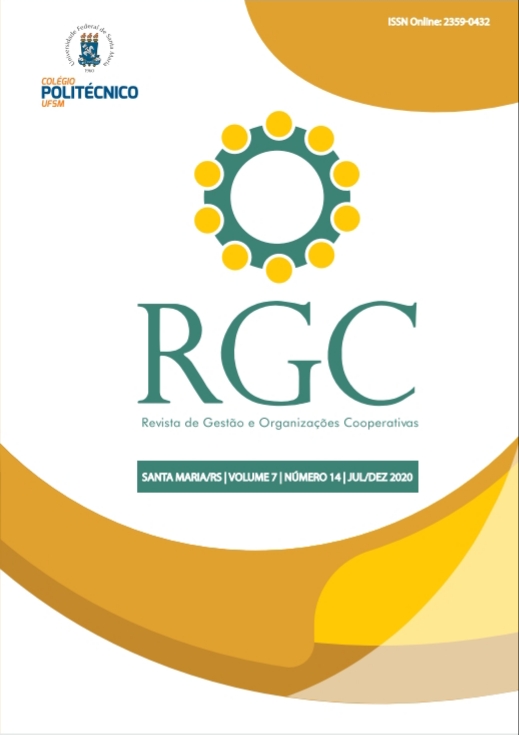Analysis of the socio-financial efficiency of credit unions in Brazil
DOI:
https://doi.org/10.5902/2359043241504Keywords:
Credit unions, socio-financial efficiency, national financial systemAbstract
The overall objective of the study was to analyze the social and financial efficiency of the credit unions in Brazil. This type of study concerns the evaluation of both business performance indicators and variables related to the social management of this type of enterprise. For this purpose, financial quotients were calculated from the financial statements of the two largest credit unions systems and the four largest banks in the period from 2014 to 2017, as well as the calculation of the costs of the main banking services and interest rates of the most important operations for the same institutions. The main results point to the superior financial performance of credit unions in relation to the largest banks. At the same time, these institutions also presented a satisfactory social performance based on the fact that their banking and credit services had a lower cost than the others organizations.Downloads
References
Assaf Neto, A., & Lima, F.G. Fundamentos de Administração Financeira. São Paulo: Atlas, 2017.
Banco Central do Brasil. Relatório de Economia Bancária - 2017. Recuperado em 06 de novembro, 2018, de https://www.bcb.gov.br/pec/depep/spread/REB_2017.pdf. (2018a)Banco Central do Brasil. Panorama do sistema nacional de crédito cooperativo. Recuperado em 06 de novembro, 2018, de https://www.bcb.gov.br/pre/microFinancas/coopcar/pdf/panorama_de_cooperativas2017.pdf. (2018b).
Bialoskorski Neto, S. Economia e gestão de organizações cooperativas. São Paulo: Atlas, 2012.
Bressan, V. G. F., Braga, M. J., Bressan, A. A., & Resende Filho, M. A. Uma aplicação do sistema PEARLS às cooperativas de crédito brasileiras. Revista de Administração (FEA-USP), 46 (3), 258-274. (2011a)
Bressan, V. G. F., Braga, M. J., Bressan, A. A., & Resende Filho, M. A. Avaliação de insolvência em cooperativas de crédito: uma aplicação do sistema PEARLS. Revista de Administração Mackenzie, 12 (2), 113-144. (2011b).
Bressan, V. G. F., Bressan, A. A., Oliveira, P. H. M. de, & Braga, M. J. Quais indicadores contábeis financeiros do sistema PEARLS são relevantes para análise de insolvência das cooperativas centrais de crédito no Brasil? Contabilidade Vista & Revista, 25 (1), 74-98. 2014.
Carvalho, F. L. de, Diaz, M. D. M., Bialoskorski, S., Neto & Kalatzis, A. E. G. Saída e insucesso das cooperativas de crédito no Brasil: uma análise do risco. Revista de Contabilidade e Finanças da USP, 26 (67), 70-84. 2015.
Ferreira, M. A. M., Gonçalves, R. M. L., & Braga, M. J. Investigação do desempenho das cooperativas de crédito de Minas Gerais por meio da Análise Envoltória de Dados (DEA). Economia Aplicada, 11 (3), 425-445. 2007.
Franke, W. Cooperativas sem capital. In: Pinho, D. B. Bases operacionais do cooperativismo. São Paulo: CNPq, 1996.
Frantz, W. Educação e cooperação: práticas que se relacionam. Sociologias, Porto alegre: UFRGS, ano 3, n. 6, jul./dez. 2001.
Frantz, W. Educação para o cooperativismo: a experiência do movimento comunitário de base de Ijuí. In: Educação Cooperativa e suas práticas. Org SCHNEIDER, J.O. Brasília: SESCOOP, 2003.
Gonçalves, R. M. L. Condicionantes do risco de liquidez em cooperativas de economia e crédito mútuo de Minas Gerais. Dissertação de Mestrado, Universidade Federal de Viçosa, Viçosa, MG, Brasil, 2005..
Jaccard, J., Becker, M. A., & Wood, G. Pairwise multiple comparison procedures: A review. Psychological Bulletin, 96(3), 589. 1984.
Lilliefors, H. W. On the Kolmogorov-Smirnov test for normality with mean and variance unknown. Journal of the American statistical Association, 62(318), 399-402. 1967.
Oliveira Júnior, C. C. de. Avaliação da Eficiência Empresarial das Cooperativas. Curitiba: Organização das Cooperativas do Estado do Paraná (OCEPAR), 1996.
Peixe, J. B., & Protil, R. M. Eficiência econômica e social das cooperativas agroindustriais paranaenses: proposta de um modelo de avaliação. Informe Gepec, 12 (2), 1-11. 2007.
Razali, N. M. & Wah, Y. B. Power comparisons of shapiro-wilk, kolmogorov-smirnov, lilliefors and anderson-darling tests. Journal of statistical modeling and analytics, 2(1), 21-33. 2011.
Reis, B. dos S., & Fontes, E. A. Análise da Eficiência Sócio Financeira de uma Cooperativa de Crédito de Minas Gerais. Revista de Gestão e Organizações Cooperativas, 4 (8), 33-46. 2017.
Rios, G.S.L. & CARVALHO, D.M. Associações de agricultores familiares como estruturas de ensaio pré-cooperativas. Economia Solidária e Ação Cooperativa (Unisinos) v.2, n.2, p.129-136, jul./dez. 2007.
Royer, J.S. The Neoclassical Theory of Cooperatives: Part I. Journal of Cooperatives. v. 28, n. 1, p. 1-19, 2014a.
Royer, J.S. The Neoclassical Theory of Cooperatives: Part II. Journal of Cooperatives. v. 28, n. 1, p. 1-19, 2014b.
Santos, C. A. dos. Cooperativa de crédito – Série empreendimentos coletivos. Brasília: SEBRAE, 2009.
Silva, A. A. da. Estrutura, análise e interpretação das demonstrações contábeis. São Paulo: Atlas, 2017.
Takamatsu, R. T., & Lamounier, W. M. A importância da atualização monetária de valores para a análise das demonstrações financeiras. Contabilidade Vista & Revista, 17 (2), 67-87. 2006.
Trindade, M. T., Ferreira Filho, F. de A., & Bialoskorski, S., Neto. Análise do desempenho financeiro das cooperativas de crédito brasileiras nos últimos dez anos. Anais do Encontro de Pesquisadores Latino Americanos de Cooperativismo, Ribeirão Preto, São Paulo, Brasil, 5. 2008.
Tukey, J. The problem of multiple comparisons. Unpublished preprint., Princeton University, 1953.
Downloads
Published
How to Cite
Issue
Section
License
Authors who publish in this journal agree to the following terms:
- Authors retain copyright and grant the journal the right of first publication, with work simultaneously licensed under the Creative Commons Attribution License that allows the sharing of work with acknowledgment of authorship and initial publication in this journal.
- Authors are authorized to enter additional contracts separately for non-exclusive distribution of the version of the work published in this journal (eg, publishing in institutional repository or as a book chapter), with acknowledgment of authorship and initial publication in this journal.
- Authors are allowed and encouraged to post and distribute their work online (eg, in institutional repositories or on their personal page) at any point before or during the editorial process, as this can bring about productive change as well as increase impact and impact. citation of published work (See The Effect of Free Access).







